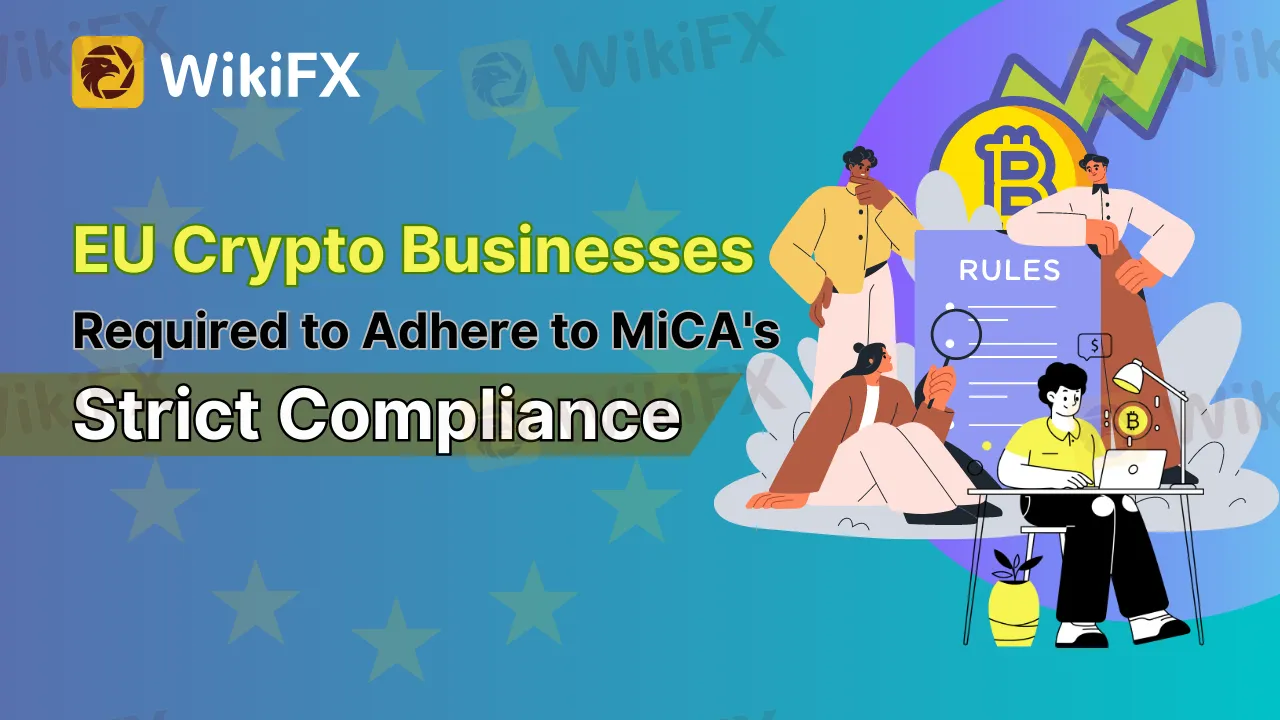简体中文
繁體中文
English
Pусский
日本語
ภาษาไทย
Tiếng Việt
Bahasa Indonesia
Español
हिन्दी
Filippiiniläinen
Français
Deutsch
Português
Türkçe
한국어
العربية
EU Crypto Businesses Required to Adhere to MiCA's Strict Compliance
Abstract:EU Crypto businesses now face MiCA's stringent regulations, promoting a secure crypto landscape. Compliance opens up growth prospects across the EU.

The European Union (EU) has recently enacted the Markets in Crypto-Assets (MiCA) regulations, ushering in a new era of legal guidelines for crypto assets and their service providers. After the initial draft in 2020, MiCA was officially listed in the Official Journal of the European Union (OJEU) on June 9, signaling the countdown for the regulation to become fully operational.
This development implies that cryptocurrency businesses across the EU must gear up to adhere to MiCAs stipulations. The enforcement of the rules concerning stablecoins is slated for June 30, 2024, followed by the application of regulations for exchanges on December 30, 2024.
Mica serves as a regulatory compass, offering a precise definition of a crypto asset. It depicts crypto assets as digitally stored value entities, which can be transmitted through distributed ledger technology (DLT). Furthermore, this law sheds light on the criteria needed to label an asset as a cryptocurrency or a token.
As per the new guidelines, individuals intending to run a crypto-based enterprise within the EU borders must seek authorization from their respective member states. Once an application is submitted, the regulatory bodies have a window of 25 business days to notify the applicants of any documentation gaps. Following this, they are granted an additional 60 business days to either approve or decline the application.
For companies in the crypto industry, adherence to MiCA shouldnt be seen as a hurdle but rather as an opportunity. Obtaining the necessary authorization comes with distinct advantages. Upon securing a license, these firms can explore growth prospects throughout the European Union.
While this may seem daunting, support is on the horizon. The European Authorities and Markets Authority is due to publish suggestions in July on the practical implementation of the MiCA guidelines. This includes details on the forms and notifications that crypto businesses and existing funds need to comply with to extend their services within the region.
As these new regulations begin to take shape, its clear that the crypto industry within the EU is entering a phase of greater clarity and stability.

The introduction of MiCA represents an essential step in the journey towards a regulated and secure crypto landscape within the EU. Companies that align with these regulations stand to reap considerable benefits, particularly the potential to expand their operations across the member states.
While the path towards compliance may be challenging, the rewards, in terms of stability and growth potential, make this a worthy endeavor for EU crypto firms. As a result, it is critical for these companies to spend in understanding and complying with these rules, not simply to fulfill legal obligations, but also to secure their survival and success in a quickly changing market.
It will be fascinating to observe how these recommendations impact the crypto business in the EU and abroad as time goes on. The coming months and years promise a blend of adaptation, growth, and evolution for crypto firms, all under the umbrella of MiCAs robust regulatory framework.
Get the latest news right at your fingertips by downloading and installing the WikiFX App on your mobile device. Click here to download the App: https://www.wikifx.com/en/download.html

Disclaimer:
The views in this article only represent the author's personal views, and do not constitute investment advice on this platform. This platform does not guarantee the accuracy, completeness and timeliness of the information in the article, and will not be liable for any loss caused by the use of or reliance on the information in the article.
Related broker
Read more

Medical Officer Trapped in a Crypto Nightmare
A medical officer in Malaysia suffered a significant financial loss after falling prey to a cryptocurrency investment scam that originated on social media. The victim, a 39-year-old woman, was deceived into transferring her savings of RM86,200 following a series of fraudulent claims promising lucrative returns.

Thailand’s War on Illegal Crypto: Five Firms Raided, Millions at Stake
In a significant move against illegal crypto-related activities, Thai authorities have cracked down on five unauthorized cryptocurrency firms operating within the country. The Economic Crime Suppression Division (ECD) conducted coordinated raids across Bangkok, Nakhon Pathom, and Samut Sakhon, leading to the arrest of 11 individuals involved in unlicensed electronic currency transactions. The operation underscores Thailand’s strict regulatory stance on financial crimes related to digital assets.

Why Hasn’t Binance Listed Pi Network (PI) Yet? Key Reasons Explained
Why hasn’t Binance listed Pi Network (PI)? Discover the key reasons, including mainnet restrictions, regulatory concerns, and what needs to happen for a future listing.

Famous Olympic Breakdancer’s Brother Faces Crypto Fraud Charges
Australian Olympic breakdancer Rachel "Raygun" Gunn’s brother, Brendan Gunn, accused of crypto fraud involving $181,000. ASIC investigates.
WikiFX Broker
Latest News
Is TUOTENDA a cryptocurrency scam primarily targeting men over the age of 50?
Canada to Enforce Retaliatory Tariffs if U.S. Duties Persist
Unbelievable! Is the Yen Really Gaining Strength?
$13M Pig Butchering Scam: Three Arrested for Money Laundering
FINMA Opens Bankruptcy Proceedings
FCA Issues Warning Against 14 Unregistered Financial Firms
Crypto Scam Exposed: 3 Arrested for Defrauding Investors
Nifty 50 Index Futures Now Available at Interactive Brokers
Grand Unveiling: The Core Reasons Behind the Yen’s Rise
Ethereum’s Shock Drop: What’s The Real Reason?
Currency Calculator






